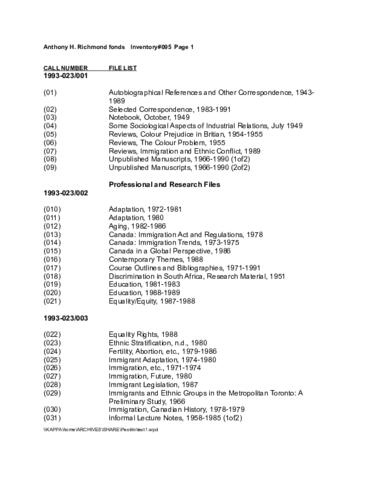Title and statement of responsibility area
Title proper
General material designation
- Textual record
Parallel title
Other title information
Title statements of responsibility
Title notes
Level of description
Reference code
Edition statement
Edition statement of responsibility
Statement of scale (cartographic)
Statement of projection (cartographic)
Statement of coordinates (cartographic)
Statement of scale (architectural)
Issuing jurisdiction and denomination (philatelic)
Dates of creation area
Date(s)
-
1943-1991 (Creation)
- Creator
- Richmond, Anthony
Physical description area
Physical description
1.2 m of textual records
Title proper of publisher's series
Parallel titles of publisher's series
Other title information of publisher's series
Statement of responsibility relating to publisher's series
Numbering within publisher's series
Note on publisher's series
Archival description area
Name of creator
Biographical history
"Anthony (Tony) Richmond, professor emeritus at York University and one of the founders of York’s Department of Sociology. Richmond was born in Ilford, England. At the age of 18, he earned a scholarship to the London School of Economics (LSE), which he deferred until the end of the war. He joined the Friends Ambulance Unit in 1943 and served in hospitals and citizens’ advice bureaux in London, as ill health prevented him from serving abroad. After earning his BA at the LSE, Richmond began a master’s degree at Liverpool University, studying the city’s community of West Indian workers.
His first job was as a lecturer in social theory in the Department of Social Study at the University of Edinburgh, during which he published his first book, The Colour Problem (1955). The second edition of this book, published in 1961, included a new chapter on apartheid in South Africa, and brought him his first international recognition, stirring considerable controversy. His critical account had him and the book banned in South Africa until the country’s first free elections in 1994.
After a short spell at the Bristol College of Advanced Technology, he received his PhD from the University of London in 1965, and moved to Toronto with his wife, Freda, and young daughter, Catriona, and became a founding member of York’s Department of Sociology. Shortly afterward, he established the department’s graduate program and served as its first director. He also served as the director of York’s Institute of Behavioural Research (now the Institute of Social Research) from 1979 to 1983. In 1980, he was elected a Fellow of the Royal Society of Canada. He was active in recruiting the next cohort of young sociologists to the department from Britain, the U.S. and Canada.
At York University, he pursued studies of immigration and immigration policy, ethno-cultural assimilation and the comparative study of immigrant and ethnic communities. He was the author of 10 books and 17 book-length monographs, over two dozen book chapters, more than 60 referred articles, and many other invited papers and commentaries.
Richmond served on many departmental and university committees, especially in York’s formative years, including a President’s Task Force on the Role & Development of Research and the Faculty of Arts Academic Planning & Policy Committee. He retired in 1989. The Blishen-Richmond Award, named for two of the Department of Sociology’s distinguished retirees, is presented annually to outstanding honours sociology graduates.
Richmond was a deeply committed public intellectual. His work on immigration and immigrant assimilation influenced the revisions of Canadian federal immigration policy in the 1960s and early 1970s. He had a lifelong commitment to research on racism, publishing pioneering studies, and placing racialization at the centre of his research on immigrant and refugee diasporas. His last book, Global Apartheid: Refugees, Racism and the New World Order(1994), returned to themes that ran throughout his work, arguing that late 20th century mass migrations and refugee movements were being met with a form of global apartheid as North America, Europe and Australasia instituted repressive policies to restrain the movements, largely treating them as threats to their territorial integrity and privileged lifestyles. He was a founding member of the York Centre for Refugee Studies in which he actively participated after his formal retirement, publishing several articles, including his last in 2008 in the journal Refuge."
Custodial history
Scope and content
Fonds consists of professorial records and includes his research files and personal files.
Notes area
Physical condition
Immediate source of acquisition
Arrangement
Language of material
Script of material
Location of originals
Availability of other formats
Restrictions on access
No restrictions on access.
Terms governing use, reproduction, and publication
Finding aids
A PDF file list is attached to this description.
Generated finding aid
Associated materials
Accruals
The fonds comprises the following accession: 1993-023. Further accruals are expected.
Alternative identifier(s)
Standard number
Standard number
Access points
Subject access points
Place access points
Name access points
Genre access points
Control area
Status
Level of detail
Dates of creation, revision and deletion
2002/04/08 date of creation
2003/04/09 date of last revision in ESS
2018/03/28 KCP. manually migrated to AtoM
2019/02/19 J. Grant. Added PDF file list.

